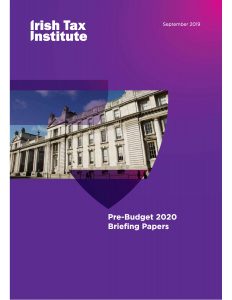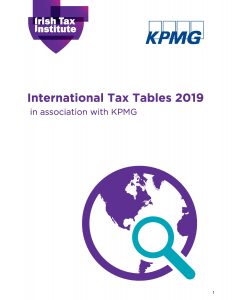18/09/19
The Irish Tax Institute supports the decision of the Minister for Finance not to reduce personal taxation in the Budget 2020.
But it warns that our tax system needs attention given the global risks to which our economy is exposed.
At its Pre-Budget Briefing, the President of the Institute, Frank Mitchell said: “The Minister is prudent to write his budget on the assumption of a no deal Brexit and to focus available resources on those sectors of our economy that would be worst hit if that risk materialises. We do, however, have concerns about the robustness of the tax system at this time of growing uncertainty. If we are to weather the storms ahead, we need a stable system that is not over dependent on any group or sector.”
Personal Taxes
Current base has narrowed, increasing dependency on specific groups
The yield from the Universal Social Charge has declined significantly over the last four years. In 2015, it accounted for 23% of the income tax take; by 2018, that number had fallen to 18%. Meanwhile, the number of taxpayers exempted from paying the charge has risen from 12% when it was first introduced in 2011 to 28% in 2019.
The USC is the broadest component of personal tax in Ireland. The IMF has recently noted that the effect of changes since 2014 means that USC no longer materially increases the tax base compared to income tax. Mr Mitchell said: “Ireland’s personal tax regime should be broadly based, simple, fair and transparent. It should support economic growth while redistributing income to lower paid workers. We believe that everybody who works should contribute to the exchequer according to their means and that those who earn most, should contribute most.”
Reported difficulties in amalgamating the USC with PRSI have thrown some doubt on the government’s future plans for the charge but the Institute strongly advises that, whatever the outcome for the USC, future budgets should focus on reducing overall income tax rates rather than removing more people from the tax base. “A system that exempts more than three quarters of a million out of a total of 2.7 million income earners, from paying any tax is not sustainable. We need a broader base where the load is spread according to the means of taxpayers,” he added.
Entry point to top rate too low
The Institute supports the Government’s commitment to raising the entry point to the higher rate of tax over the next five years. High marginal tax rates make it more difficult to attract skilled workers, particularly in a tight labour market. While the decision to rule out tax cuts in Budget 2020 has stalled progress on the Government’s plan, raising the threshold at which the marginal rate applies must remain at the top of the Government’s agenda, according to the Institute. “Workers in Ireland pay tax at the higher rate of 40% on income over €35,300. That threshold is very low by comparison with competitor countries and it undoubtedly damages our competitiveness at a time when we can least afford it. It is understandable that the Minister has chosen not to make any immediate changes in light of the current uncertainty but the disruption likely to be caused by a hard Brexit will, in our view, accelerate the need for change in this area.”
Property Tax
Broader based, more stable system needed to weather the storms ahead
The Institute is also concerned about the repeated postponement of property valuations for the Local Property Tax (LPT). “Like the USC, the LPT, is a base broadening measure and there is a high level of compliance among taxpayers. The failure to review the valuation bands and the current exemptions risks undermining that compliance. If it is to survive as an effective arm of our tax system, LPT must be reviewed so that it remains current,” said Mr Mitchell.
SME Tax Issues
Strong support needed for SMEs in face of Brexit threat
The Minister for Finance has said, Budget 2020 must focus resources on sectors of the economy most exposed in the event of a no deal Brexit. Chief among them, according to the Institute, is the SME sector which is largely dependent on the UK market. The Institute is calling for:
- a more generous CGT relief for entrepreneurs to make Ireland more competitive with the UK where the limit for relief is ten times that applicable in Ireland.
- changes to allow highly prized angel investors to avail of the relief.
- changes to make the Employment and Investment Incentive (EII) more effective
- and the Start-Up Relief for Entrepreneurs (SURE) income tax refund scheme to be extended to the self-employed.
It also wants the Key Employee Engagement Programme (KEEP) share scheme to be reformed to make it more accessible to SMEs whose difficulties in attracting skilled workers is limiting their productivity. “We need to build productivity in our indigenous sector so that we are not so dependent on multinationals. We will be relying on our own businesses and risk takers to make our economy and our tax base resilient in these uncertain times,” concluded the President of the Irish Tax Institute.
The full Pre-Budget 2020 Briefing Papers can be downloaded here
You can also download the International Tax Tables in association with KPMG
Join us in Cork or Dublin at our Budget 2020 Breakfast Briefing to learn more



 Share this
Share this  Share this
Share this